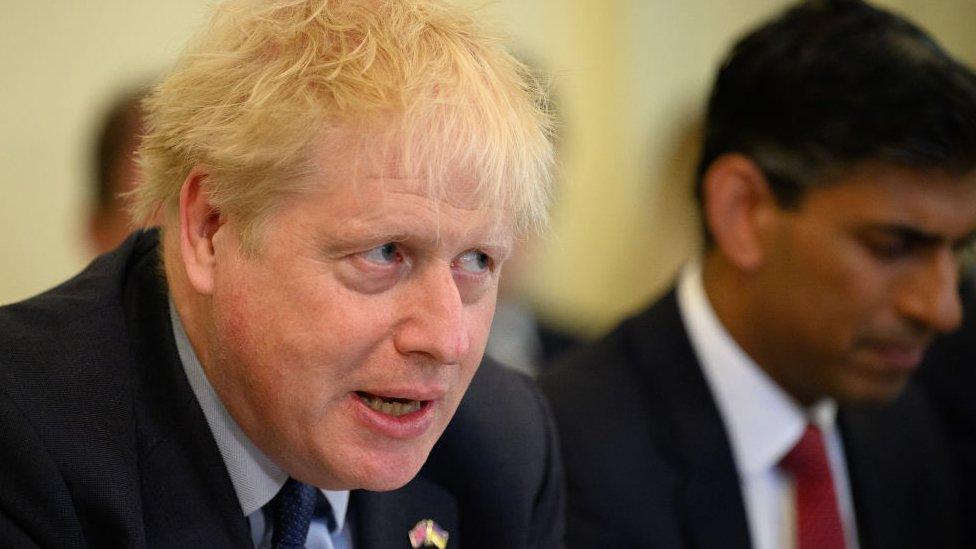No confidence vote: What happens next for PM Boris Johnson?
- Published

A majority of Tory MPs have said they want Boris Johnson to remain party leader and prime minister.
But critics suggest his authority has been undermined and he still faces challenges to keep his job.
What was the result of the confidence vote?
All 359 Conservative MPs took part in the vote.
Mr Johnson received the support of 211 of them, with 148 voting against him.
The result means Mr Johnson was supported by 59% of his MPs.
As the ballot was held in secret, Tory MPs don't have to say how they voted, but some have chosen to do so.
How have other votes ended?
Boris Johnson is not the first prime minister to have been challenged.
Theresa May: In a vote over her Brexit policy, Mrs May survived a confidence vote with a majority of 83 in December 2018. Despite winning, she resigned as PM six months later
Iain Duncan Smith: Following months of speculation the Tory leader narrowly lost a confidence vote in October 2003, external and resigned
John Major: Triggered a contest in 1995 by resigning as leader of the Tory party (though not as prime minister) amid disagreements inside the party over Europe. Mr Major beat challenger John Redwood, but went on to lose the 1997 election
Margaret Thatcher: Resigned as PM in 1990 after failing to win outright victory for party leadership, external. She beat Michael Heseltine by 204 votes to 152, but was persuaded to stand down by her Cabinet
What happens now Mr Johnson has won?
Having survived, Mr Johnson can continue as Conservative Party leader and therefore prime minister.
However, by-elections to pick new MPs in Wakefield and Tiverton and Honiton will be held on 23 June.
If they are taken by opposition parties, Mr Johnson could find himself under renewed pressure.
Could Mr Johnson still be removed?
Although Mr Johnson won the vote, MPs could still consider options to try to remove him:
Change the rules
At present, Conservative MPs will not be allowed to hold another confidence vote for a year.
However, there has been speculation the rules could be changed, in order to hold another vote sooner.
When asked about it, Sir Graham Brady MP - the chairman of a group called the 1922 Committee, which represents Tory backbenchers - said "technically, it's possible".

Cabinet pressure
The Cabinet - made up senior members of the government - could put political pressure on the PM to resign.
This happened to Margaret Thatcher in 1990, external, despite having defeated Michael Heseltine who had challenged for the leadership.
A far less likely route would be for the Cabinet to go the Queen and declare they don't have confidence in the PM. However, this "would drag the Queen into a very difficult position" says Catherine Haddon from the Institute for Government.
Motion of no confidence in the prime minister
A confidence vote where all MPs - not just Conservatives - get to vote has been proposed by Liberal Democrat leader Sir Ed Davey.
The government is very unlikely to make time in Parliament to hold such a vote, according to Ms Haddon.
However, if the leader of the opposition - Labour leader Sir Keir Starmer - introduces the motion, convention means the government will provide time.
It would need just one more MP to vote in favour than the number voting against in order to pass.
However, Tory MPs are very unlikely to go down this path says Ms Haddon: "They would only use this mechanism as a last resort if they had no other way to dislodge Boris Johnson."

How would a leadership contest work?
If Mr Johnson stood down, a leadership contest would be triggered. The eventual winner would become prime minister.
In order to stand, candidates need the support of eight other Tory MPs.
If there are more than two candidates, Tory MPs will hold a series of votes until only two remain.
in the first round, candidates must get 5% of the votes to stay in the running (18 MPs)
in the second round, they must get 10% (36 MPs)
in the following rounds, the candidate with the least votes is eliminated
When two MPs are left, Conservative Party members around the country - not just MPs - will vote for the winner.

